#like... the way things are set up economically and culturally
Text
Homemaking, gardening, and self-sufficiency resources that won't radicalize you into a hate group

It seems like self-sufficiency and homemaking skills are blowing up right now. With the COVID-19 pandemic and the current economic crisis, a lot of folks, especially young people, are looking to develop skills that will help them be a little bit less dependent on our consumerist economy. And I think that's generally a good thing. I think more of us should know how to cook a meal from scratch, grow our own vegetables, and mend our own clothes. Those are good skills to have.
Unfortunately, these "self-sufficiency" skills are often used as a recruiting tactic by white supremacists, TERFs, and other hate groups. They become a way to reconnect to or relive the "good old days," a romanticized (false) past before modern society and civil rights. And for a lot of people, these skills are inseparably connected to their politics and may even be used as a tool to indoctrinate new people.
In the spirit of building safe communities, here's a complete list of the safe resources I've found for learning homemaking, gardening, and related skills. Safe for me means queer- and trans-friendly, inclusive of different races and cultures, does not contain Christian preaching, and does not contain white supremacist or TERF dog whistles.
Homemaking/Housekeeping/Caring for your home:
Making It by Kelly Coyne and Erik Knutzen [book] (The big crunchy household DIY book; includes every level of self-sufficiency from making your own toothpaste and laundry soap to setting up raised beds to butchering a chicken. Authors are explicitly left-leaning.)
Safe and Sound: A Renter-Friendly Guide to Home Repair by Mercury Stardust [book] (A guide to simple home repair tasks, written with rentals in mind; very compassionate and accessible language.)
How To Keep House While Drowning by KC Davis [book] (The book about cleaning and housework for people who get overwhelmed by cleaning and housework, based on the premise that messiness is not a moral failing; disability and neurodivergence friendly; genuinely changed how I approach cleaning tasks.)
Gardening
Rebel Gardening by Alessandro Vitale [book] (Really great introduction to urban gardening; explicitly discusses renter-friendly garden designs in small spaces; lots of DIY solutions using recycled materials; note that the author lives in England, so check if plants are invasive in your area before putting them in the ground.)
Country/Rural Living:
Woodsqueer by Gretchen Legler [book] (Memoir of a lesbian who lives and works on a rural farm in Maine with her wife; does a good job of showing what it's like to be queer in a rural space; CW for mentions of domestic violence, infidelity/cheating, and internalized homophobia)
"Debunking the Off-Grid Fantasy" by Maggie Mae Fish [video essay] (Deconstructs the off-grid lifestyle and the myth of self-reliance)
Sewing/Mending:
Annika Victoria [YouTube channel] (No longer active, but their videos are still a great resource for anyone learning to sew; check out the beginner project playlist to start. This is where I learned a lot of what I know about sewing.)
Make, Sew, and Mend by Bernadette Banner [book] (A very thorough written introduction to hand-sewing, written by a clothing historian; lots of fun garment history facts; explicitly inclusive of BIPOC, queer, and trans sewists.)
Sustainability/Land Stewardship
Braiding Sweetgrass by Robin Wall Kimmerer [book] (Most of you have probably already read this one or had it recommended to you, but it really is that good; excellent example of how traditional animist beliefs -- in this case, indigenous American beliefs -- can exist in healthy symbiosis with science; more philosophy than how-to, but a great foundational resource.)
Wild Witchcraft by Rebecca Beyer [book] (This one is for my fellow witches; one of my favorite witchcraft books, and an excellent example of a place-based practice deeply rooted in the land.)
Avoiding the "Crunchy to Alt Right Pipeline"
Note: the "crunchy to alt-right pipeline" is a term used to describe how white supremacists and other far right groups use "crunchy" spaces (i.e., spaces dedicated to farming, homemaking, alternative medicine, simple living/slow living, etc.) to recruit and indoctrinate people into their movements. Knowing how this recruitment works can help you recognize it when you do encounter it and avoid being influenced by it.
"The Crunchy-to-Alt-Right Pipeline" by Kathleen Belew [magazine article] (Good, short introduction to this issue and its history.)
Sisters in Hate by Seyward Darby (I feel like I need to give a content warning: this book contains explicit descriptions of racism, white supremacy, and Neo Nazis, and it's a very difficult read, but it really is a great, in-depth breakdown of the role women play in the alt-right; also explicitly addresses the crunchy to alt-right pipeline.)
These are just the resources I've personally found helpful, so if anyone else has any they want to add, please, please do!
#homemaking#homemaking resources#gardening#urban gardening#self sufficiency#self sufficient living#sustainability#sustainable living#homesteading#nontrad homemaker#nontrad housewife#urban homesteading#solarpunk#cottagecore#kitchen witch#kitchen witchcraft#crunchy to alt right pipeline#book rec#book recommendations#resource#long post#mine#racism tw#racism mention#transphobia tw#transphobia mention
1K notes
·
View notes
Text
morality: a character creation guide
creating and understanding your oc’s personal moral code! no, i cannot tell you whether they’re gonna come out good or bad or grey; that part is up to you.
anyway, let’s rock.
i. politics
politics are a good way to indicate things your character values, especially when it comes to large-scale concepts such as government, community, and humanity as a whole.
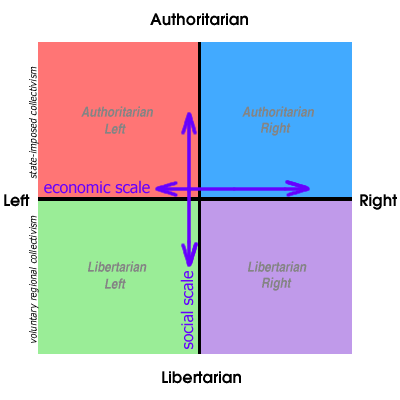
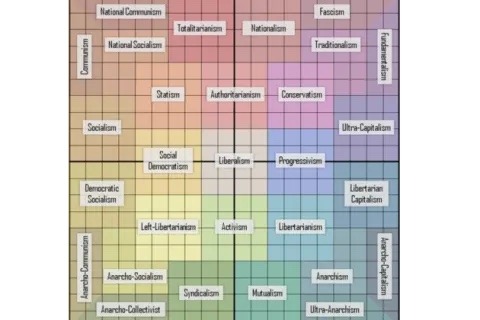
say what you will about either image; i’d argue for the unintiated, the right image is a good introduction to some lesser discussed ideologies… some of which your oc may or may not fall under.
either way, taking a good look at your character’s values on the economic + social side of things is a good place to start, as politics are something that, well… we all have ‘em, you can’t avoid ‘em.
clearly, this will have to be adjusted for settings that utilize other schools of thought (such as fantasy + historical fiction and the divine right of kings), but again, economic/social scale plotting will be a good start for most.
ii. religion + philosophy
is your oc religious? do they believe in a form of higher power? do they follow some sort of philosophy?
are they devout? yes, this applies to non-religious theist and atheist characters as well; in the former’s case… is their belief in a higher power something that guides many of their actions or is their belief in a higher power something that only informs a few of their actions? for the atheists; do they militant anti-theists who believe atheism is the only way and that religion is harmful? or do they not care about religion, so long as it’s thrust upon them?
for the religious: what is your oc’s relationship with the higher power in question? are they very progressive by their religion’s standards or more orthodox? how well informed of their own religion are they?
does your oc follow a particular school of philosophical thought? how does that interact with their religious identification?
iii. values
by taking their political stance and their religious + philosophical stance, you have a fairly good grasp on the things your character values.
is there anything they value - due to backstory, or what they do, or what they love - that isn’t explained by political stance and religious and/or philosophical identification? some big players here will likely be your oc’s culture and past.
of everything you’ve determined they value, what do they value the most?
iv. “the line”
everyone draws it somewhere. we all have a line we won’t cross, no matter the lengths we go for what we believe is a noble cause. where does your character draw it? how far will they go for something they truly believe is a noble cause? as discussed in part iii of my tips for morally grey characters,
would they lie? cheat? steal? manipulate? maim? what about commit acts of vandalism? arson? would they kill?
but even when we have a line, sometimes we make exceptions for a variety of reasons. additionally, there are limits to some of the lengths we’d go to.
find your character’s line, their limits and their exceptions.
v. objectivism/relativism
objectivism, as defined by the merriam-webster dictionary, is “an ethical theory that moral good is objectively real or that moral precepts are objectively valid.”
relativism, as defined by the merriam-webster dictionary, is “a view that ethical truths depend on the individuals and groups holding them.”
what take on morality, as a concept, does your character have? is morality objective? is morality subjective?
we could really delve deep into this one, but this post is long enough that i don’t think we need to get into philosophical rambling… so this is a good starting point.
either way, exploring morality as a concept and how your character views it will allow for better application of their personal moral code.
vi. application
so, now you know what they believe and have a deep understanding of your character’s moral code, all that’s left is to apply it and understand how it informs their actions while taking their personality into account.
and interesting thing to note is that we are all hypocrites; you don’t have to do this, but it might be fun to play around with the concept of their moral code and add a little bit of hypocrisy to their actions as a treat.
either way, how do your character’s various beliefs interact? how does it make them interact with the world? with others? with their friends, family, and community? with their government? with their employment? with their studies? with the earth and environment itself?
in conclusion:
there’s a lot of things that inform one’s moral compass and i will never be able to touch on them all; however, this should hopefully serve as at least a basic guide.
#ldknightshade.txt#writing#writing tips#creative writing#writing ideas#writing inspiration#writing advice#writing help#how to write#writing tumblr#writeblr
1K notes
·
View notes
Text
against the logic of the lawn
Imagine a box.
This box is sealed with tape or adhesive, which shows you that it has never been opened or re-used. It is in pristine condition. Apart from that, the box could hold anything. It could contain a Star Wars Funko Pop, a printer, a shirt ordered from some sketchy online vendor, a knockoff store-brand cereal, six individually wrapped protein bars.
As a Consumer ("the" Consumer) this is your fundamental right: To purchase a box that is, presumably, identical to every other box like it.
When you Buy Product, it arrives in a box, entire of itself and without context. It has not changed since its creation. If and when Product does change—whether it is broken, spoiled, used up, or eaten—you can Buy Product that is identical in every meaningful way to the original.
It's okay if this doesn't make sense yet. (You can stop imagining the box now.)
Imagine instead a suburban housing development, somewhere in the USA.
Imagine row on row of pristine, newly built houses, each constructed with small, meaningless variations in their aesthetic, all with beige or white vinyl siding and perhaps some decorative brick, all situated on identical rectangles of land covered with freshly unrolled sod. This is the Product that every consumer aspires to Buy.
I am not exactly—qualified, or entitled, to speak on the politics of land ownership in this country. My ancestors benefited directly from the genocide of Native Americans, which allowed Europeans to steal the land they lived on, which is where a lot of wealth comes from in the end, even today. However, I have eyes in my head to see that the act of colonizing a continent, and an economic system that formed as a supporting infrastructure to colonization, have embedded something almost irreparably dysfunctional into the dominant American culture's relationship to land.
This dysfunctional Thing, this Sickness, leads us to consider land to be a Product, and to consider a human upon the land to be a Consumer.
From this point of view, land is either locked into this relationship of control and "use" to varying extents, or it is free of human influence. People trying to reason about how to preserve Earth's biosphere, working within this framework without realizing, decide that we must "set aside" large areas of land for "nature."
This is a naive and, I would reckon, probably itself colonialist way of seeing things. It appears to be well-validated by evidence. Where human population is largest, there is less biodiversity.
But I find the broad conclusions to be strikingly unscientific. The plan of "setting aside part of Earth for nature" displays little curiosity about the mechanisms by which human presence impacts biodiversity. Otherwise intelligent people, perhaps caught up in the "bargaining" phase of climate grief, seem taken in by the idea that the human species gives off a magical anti-biodiversity force field, as if feeling guiltier will fix the problems.
(Never mind that lands managed by indigenous folk actually have MORE biodiversity...almost like our species' relationship to the planet isn't inherently exploitative, but rather, the capitalist and colonialist powers destroying everything.......)
Let's go back to the image of the new housing development. This image could be just about anywhere in the USA, because the American suburban home is made for universal interchangeability, where each little house and yard is static and replaceable with any other.
Others have written about the generic-ification of the interiors of homes, how houses are decorated with the most soul-killing, colorless furnishings to make them into Products more effectively. (I think @mcmansionhell wrote about it.)
This, likewise, is the Earth turned into a Product—razed down into something with no pre-existing context, history, or responsibility. Identical parcels of land, identical houses, where once there was a unique and diverse distribution of life. The American lawn, the American garden, the industry that promotes these aesthetics, is the environmental version of that ghastly, ugly "minimalism" infecting the interiors of homes.
The extremely neat, sparse, manicured look that is so totally inescapable in American yards originated from the estates of European aristocracy, which displayed the owner's wealth by flaunting an abundance of land that was both heavily managed and useless. People defend the lawn on the basis that grass tolerates being walked upon and is good for children to play, but to say this is *the* purpose of a lawn is bullshit—children are far more interested in trees, creeks, sticks, weeds, flowers, and mud than Grass Surface, many people with lawns do not have children, and most people spend more time mowing their lawn than they do doing literally anything else outside. How often do you see Americans outside in their yards doing anything except mowing?
What is there to do, anyway? Why would you want to go outside with nothing but the sun beating down on you and the noise of your neighbors' lawn mowers? American culture tries to make mowing "manly" and emphasizes that it is somehow fulfilling in of itself. Mowing the lawn is something Men enjoy doing—almost a sort of leisure activity.
I don't have something against wanting a usable outdoor area that is good for outdoor activities, I do, however, have something against the idea that a lawn is good for outdoor activities. Parents have been bitching for decades about how impossible it is to drag kids outdoors, and there have been a million PSAs about how children need to be outside playing instead of spending their lives on video games. Meanwhile, at the place I work, every kid is ECSTATIC and vibrating with enthusiasm to be in the woods surrounded by trees, sticks, leaves, and mud.
The literal, straightforward historical answer to the lawn is that the American lawn exists to get Americans to spend money on chemicals. The modern lawn ideal was invented to sell a surplus of fertilizer created after WW2 chemical plants that had been used to make explosives were repurposed to produce fertilizer. Now you know! The more analytical, sociological answer is that the purpose of the lawn is to distance you from the lower class. A less strictly maintained space lowers property values, it looks shabby and unkempt, it reflects badly on the neighborhood, it makes you look like a "redneck." And so on. The largest, most lavish McMansions in my area all have the emptiest, most desolate yards, and the lush gardens all belong to tiny, run-down houses.
But the answer that really cuts to the core of it, I think, is that lawns are a technology for making land into a Product for consumers. (This coexists with the above answers.) Turfgrass is a perfectly generic blank slate onto which anything can be projected. It is emptiness. It is stasis.
I worry about the flattening of our imaginations. Illustrations in books generally cover the ground outdoors in a uniform layer of green, sometimes with strokes suggesting individual blades of grass if they want to get fancy. Video games do this. Animated shows and movies do this.
Short, carpet-like turfgrass as the Universal Outdoor Surface is so ubiquitous and intuitive that any alternative is bizarre, socially unacceptable, and for many, completely unimaginable. When I am a passenger in a car, what horrifies me the most to see out the window is not only the turfgrass lawns of individuals, but rather, the turfgrass Surface that the entire inhabited landscape has been rendered into—vacant stretches of land surrounding businesses and churches, separating parking lots, bordering Wal-Marts, apartment complexes, and roadsides.
These spaces are not used, they are almost never walked upon. They do nothing. They are maintained, ceaselessly, by gas-powered machines that are far, far more carbon-emitting than cars per hour of use, emitting in one hour the same amount of pollution as a 500-mile drive. It is an endless effort to keep the land in the same state, never mind that it's a shitty, useless state.
Nature is dynamic. Biodiversity is dynamic. From a business point of view, the lawn care industry has found a brilliant scheme to milk limitless money from people, since trying to put a stop to the dynamism and constant change of nature is a Sisyphean situation, and nature responds with increasingly aggressive and rapid change as disturbance gets more intense.
On r/lawncare, a man posted despairingly that he had spent over $1500 tearing out every inch of sod in his yard, only for the exact same weeds to return. That subreddit strikes horror in my heart that I cannot describe, and the more I learn about ecology, the more terrible it gets. It was common practice for people in r/lawncare to advise others to soak their entire yard in Roundup to kill all plant life and start over from a "blank slate."
Before giving up, I tried to explain over and over that it was 100% impossible to get a "blank slate." Weeds typically spread by wind and their seeds can persist for DECADES in the soil seed bank, waiting for a disastrous event to trigger them to sprout. They will always come back. It's their job.
It was impossible for those guys to understand that they were inherently not just constructing a lawn from scratch, and were contending with another power or entity (Nature) with its own interests.
The logic of the lawn also extends into our gardens. We are encouraged to see the dynamism of nature as something that acts against our interests (and thus requires Buy Product) so much, that we think any unexpected change in our yard is bad. People are sometimes baffled when I see a random plant popping up among my flowers as potentially a good thing.
"That's a weed!" Maybe! Nonetheless, it has a purpose. I don't know who this stranger is, so I would be a fool to kill it!
A good caretaker knows that the place they care for will change on its own, and that this is GOOD and brings blessings or at least messages. I didn't have to buy goldenrod plants—they came by themselves! Several of our trees arrived on their own. The logic that sees all "weeds" as an enemy to be destroyed without even identifying ignores the wisdom of nature's processes.
The other day at work, the ecologist took me to see pink lady's slipper orchids. The forest there was razed and logged about a hundred years ago, and it got into my head to ask how the orchids returned. He only shrugged. "Who knows?"
Garden centers put plants out for sale when they are blooming. People buy trees from Fast Growing Trees dot com. The quick, final results that are standard with Buy Product, which are so completely opposite the constant slow chaos of nature, have become so standard in the gardening world that the hideous black mulch sold at garden centers is severed from the very purpose of mulch, and instead serves to visually emphasize small, lonely plants against its dark background. (For the record, once your plants mature, you should not be able to SEE the mulch.)
Landscapers regularly place shrubs, bushes, trees and flowers in places where they have no room to reach maturity. It's standard—landscapers seem to plan with the expectation that everything will be ripped out within 5-10 years. The average person has no clue how big trees and bushes get because their entire surroundings, which are made of living things (which do in fact feel and communicate) are treated as disposable.
Because in ten years, this building won't be an orthodontists' office, in ten years, this old lady will be dead, in ten years, the kids will have grown, and capitalism is incapable of preparing for a future, only for the next buyer.
The logic of the lawn is that gardens and ecosystems that take time to build are not to be valued, because a lush, biodiverse garden is not easily sold, easily bought, easily maintained, easily owned, or easily treated with indifference. An ecosystem requires wisdom from the caretaker. That runs contrary to the Consumer identity.
And it's this disposable-ness, this indifference, that I am ultimately so strongly against, not grass, or low turf that you can step on.
What if we saw buying land as implying a responsibility to be its caretaker? To respect the inhabitants, whether or not we are personally pleased by them or think they look pretty? What creature could deserve to be killed just because it didn't make a person happy?
But the Consumer identity gives you something else...a sense of entitlement. "This is MY yard, and that possum doesn't get to live there." "This is MY yard, and I don't want bugs in it." "This is MY yard, and I can kill the spiders if I want to."
Meanwhile there is no responsibility to build the soil up for the next gardener. No responsibility to plant oaks that will grow mighty and life-giving. No responsibility to plant fruit-producing trees, brambles, and bushes. None of these things, any of which could have fulfilled a responsibility to the future. Rather, just to do whatever you damn well please, and leave those that come after with depleted, compacted soil and the aftermath of years of constant damage. It took my Meadow ten years to recover from being the garden patch of the guy that lived here before us. Who knows what he did to it.
The loss of topsoil in all our farmland is a bigger example, and explains how this is directly connected to colonialism. The Dust Bowl, the unsustainable farming practices that followed, the disappearance of the lush fertile prairie topsoil because of greed and colonizer mindset, and simple refusal to learn from what could be observed in nature. The colonizing peoples envisioned the continent as an "Empty" place, a Blank Slate that could be used and exploited however.
THAT is what's killing the planet, this idea that the planet is to be used and abused and bought and sold, that the power given by wealth gives you entitlement to do whatever you want. That "Land" is just another Product, and our strategies for taking care of Earth should be whatever causes the most Buy Product.
It's like I always write..."You are not a consumer! You are a caretaker!"
#plants#native plants#no lawns#kill your lawn#anti lawn#consumerism#capitalism#colonialism#genocide tw
2K notes
·
View notes
Note
Hi! Big fan :) You're an environmental lecturer, right? I recently got into a debate with someone about rewilding in the UK, and the clash with farmers and agriculture. To me, this is a no-brainer - I absolutely do feel for farmers losing their livelihoods, and I think there needs to be a system to help them transition to something else, but also, the planet is dying. But you explain things well, so I wondered if you have thoughts? Particularly on the Welsh side of things. Thank you in advance!
Hah. I literally have a lecture on this. Or, well, a chunk of a lecture, anyway; so yes! I have thoughts. I'll use those notes, and stick a big reference at the end in case you want to read more
I'll talk about this specifically from the Welsh perspective, okay so:
The rewilding project in Wales is the Cambrian Wildwood, launched in 2004ish by a guy who bought an abandoned farm in the northern end of Mid Wales with the express intention of rewilding it. The aim is to convert some 7000 acres, and the initial mission statement said they'd reintroduce wolves and lynx. That's the project I'm going to talk about, because it's a great case study for how to spectacularly fuck something up (and eventually realise you've spectacularly fucked up, and do something about it.)
These are the Cambrian Mountains:

When looking at that, there are two competing viewpoints that are relevant here:
The Cambrians are ecologically depleted. Their biodiversity has crashed since the Second World War, when modern farming methods were introduced. Environmentally, there is a perception of emptiness and degradation.
The landscape is a glorious one that has been shaped by the human actions taken on it for generations, as we are a shepherding culture – culture and land are inextricably intertwined.
That's a big fundamental difference! Two people can look at that same photo, and see something diametrically opposed. But there's more lying on it, so you also need to understand the socio-political background.
Socio-Political Background
(I know! Headings! So professional)
A lot of rewilding – Cambrian Wildwood included – is taking place in areas where farming is declining for various political/socio-economic reasons, so this can be ENTIRELY FAIRLY seen as yet another threat. This goes hand in hand with rural migration and community decline, too.
In Wales, we’re mostly rural, and characterised by extensive upland livestock farming (sheep in particular). Most farms are small to medium family-run setups. ON TOP OF THAT, the vast majority of Welsh farmers are Welsh-speaking, and the right to operate a farm the ‘traditional’ way without UK government oversight is seen by Welsh Nationalists as an important post-colonial act.
Many of them didn’t even like the National Parks being set up, as they were seen as an English outsider imposition that ignored the working nature and cultural history of the land. Remember: the farmed uplands are often seen as a heartland of Welsh identity, and those have historically been intentionally destroyed by UK central government land management decisions (e.g. Tryweryn, Elan, Claerwen, etc)
“Over the past half century we have witnessed the arrival of countless environmental fundamentalists… seemingly oblivious to the fact that their new-found paradise is already occupied by people whose connection with the land is deep rooted, dates back thousands of years, and is embedded in their language and culture.” (Nick Fenwick [Farmers’ Union of Wales] 2013)
SO IT’S CULTURALLY DICEY
(And in my opinion an incredibly stupid idea to go and give it a primarily English name with a Welsh translation as an afterthought but that is Elanor’s Opinion and not Scientific Fact)
(But fr fr if you ever have to get involved in these sorts of projects you will go a long way if you have the basic respect of learning the Welsh names and pronouncing them right rather than lazily expecting everything to be in English sorry sorry I digress)
From the Cambrian Wildwood’s Mission Statement on their website, their objective is:
“To rewild or restore land to a wilder state to create a functioning ecosystem where natural processes dominate by carrying out habitat restoration, removing domestic livestock, and introducing missing native species as far as feasible.”
Can you see the controversial bit of the statement
Can you see the bit where they directly say they want to remove domestic livestock
Jesus Christ
Cultural Differences
AND THEN HERE'S THE BIGGER PROBLEM
‘Culture’ in Welsh is diwylliant – literally, a ‘lack of wildness’. There is no direct translation into Welsh for the term ‘rewilding’ – the closest you can get is anialwch or diffeithwch, which mean ‘wilderness’ in the sense of ‘desert’ or ‘wasteland’. So right off the bat, if you tell a Welsh-speaking farmer that you want to rewild the place, what they hear is "We want to make it dangerous and empty and degraded."
A related concept is cynefin - knowing one’s ‘patch’ and the feeling of belonging associated. The term has its roots as a description of the way grazing animals know their area of mountain land, but it is also used to describe how people come to form an intimate experiential knowledge of place - and specifically, a Welsh farmer's cultural attitude.
Basically, Welsh literature and oral traditions speak of a relationship with the land, not a separation and longing for an untouched wilderness. Farmers feel this especially keenly. Culturally, this is a big part of why they do it – they’re rooted to the land, and therefore to their identities.
“Interviewees conveyed this by referring to areas proposed for rewilding as being comprised of “a quilt of cynefinoedd: interwoven stories, the layered and collective place-making of families and individuals over-generations, co-constituted with the physical landscape” (Wynne-Jones, Holmes and Strouts, 2018)
So, to them, rewilding is erasing and disregarding these stories. To them, this is not just a land-use change, but the latest colonial attack. They've known the family who lived on that farm for generations - every birth, marriage, death, joy, triumph, loss, everything. You are saying that you are going to strip that family, all those stories, all those people out of that land, to be forgotten.
…
However. There is a counterpoint to this.
Many farmers taking this view have therefore identified themselves as the only “truly Welsh” people in the debate, accusing environmentalists as being outsiders. The problem with this being, most of the environmentalists involved with the project are also Welsh; so who the fuck are they to say who is or is not Truly Welsh? It's what we on the internet would recognise as gatekeeping, with a big side order of No True Scotsman fallacy.
Also this quote sums it up well:
“Sheep farming in this country goes back a few hundred years. I think if you go deep enough into our culture and ancestry, we have a really deep native relationship with wild forest areas and with the wild animals that are native to this country…I just don’t agree that sheep farming is really part of our traditional culture.” (WWLF Interview [15] 2016) (Wynne-Jones, Holmes and Strouts, 2018)
This is also a fair point. It is true that upland sheep farming, the way we now practice it, is only a few hundred years old, and at the current intensity only a few decades (since WW2).
On top of which, there has been plenty of exploration over the years of farmers as being a government-subsidised landed gentry, which I won't go into here, but it also contains some fair points.
In truth, all of it and none of it is true. It’s far more complex and nuanced than either side might want to believe.
Solutions So Far
This is an ongoing project and they're still learning and changing new things and stuff, but a big thing they did was get someone in to basically be a mediator and listen to both sides, because Jesus, those sides were not listening to each other.
But to date:
They actually worked with a first-language Welsh speaker (WHY DID THEY NOT DO THIS FIRST I'm sorry I'm fine). Originally the Welsh translation of the project was Tir Gwyllt – wild land. But given that Welsh connotations with gwyllt are something out of control or dangerous, Coetir Anian has been chosen – anian refers to a sense of natural order and creation, a sense of health and vitality.
Similarly, ‘rewilding’ is being translated as ‘di-ddofi’ – ‘de-taming’. This acknowledges the labour and culture taken to tame it, and just suggests an avenue for discussing some relaxation of farming practice in appropriate locations rather than, you know, releasing packs of wolves directly into sheep pens
In online materials and in community engagement events where traditional storytellers and musicians have performed to celebrate the Wildwood, the trustees have drawn heavily from Welsh myth in the form of the Mabinogion. Enormous amounts of the Mab lovingly and respectfully feature wild woods and wild animals. The emphasis is therefore on how wilderness is also part of Welsh identity – and arguably a much older part, going back to the Celts. (This is clever, in my view, but something to approach with care - it's rarely a good idea to play the game of "What's the most Welsh". But so far it's been done sensitively)
Land purchased for the project has so far been wholly limited to that available in the public domain. The main site, Bwlch Corog, was empty and unfarmed for six years before purchase, which has been stressed in all media interviews and releases; this is important, because farmers do have a sense of "Productive land is being stolen by environmentalists".
Large predator reintroductions have largely been abandoned. Lynx and wolves are no longer on the agenda. It’s possible they’ll be included in the future, but it is acknowledged as currently impractical (both from clashes with farmers and lack of habitat).
Instead, they’ve supported smaller species reintroductions, such as the Vincent Wildlife Trust’s pine marten translocations, and some proposed red squirrel ones.
Bwlch Corog is to be managed as an experimental plot that farmers are encouraged to engage with.
Assessing the potential for new income streams (from improved tourism and educational activities) rather than just the ecological benefits – this has become central to the project, and the emphasis is on how this might benefit farming communities and keep them together. This has been huge, and has also been successful in rewilding schemes in Europe.
Tensions are a lot lower now than they were ten years ago, but ultimately the problem was a bunch of outsiders came in and decided they knew best without listening to anyone else's point of view, and that meant both sides really dug their heels in. Much better now.
Ultimately... yes, I am in favour of rewilding, in a general sense. But I think it needs to go hand in hand with supplying farmers with the necessary subsidies to transition back to more traditional and sustainable farming methods, and the two elements run side by side. You can't do one without the other, not if you want them to succeed. The Pontbren Project is a great case study for how a farmer-led scheme can successfully aid them economically while also improving environmental outcomes, and we need to learn and incorporate more lessons from it when discussing this kind of landscape-level management.
Also, with land management in general, I think you're a fucking idiot and dangerously arrogant if you think you can get anything done without all stakeholders being on board. And potentially wandering down the ecofascism path, circumstances dependent.
Anyway, those are my thoughts. Source:
Wynne-Jones, S, Holmes, G & Strouts, G (2018), 'Abandoning or Reimagining a Cultural Heartland? Understanding and Responding to Rewilding Conflicts in Wales - the case of the Cambrian Wildwood.' Environmental Values, vol. 27, no. 4.
825 notes
·
View notes
Text
realities, maximalism,and the need for big book™️
some gubat banwa design thoughts vomit: since the beginning of its development i've kind of been enraptured with trying to really go for "fiction-first" storytelling because PbtA games really are peak roleplaying for me, but as i wrote and realized that a lot of "fiction first" doesn't work without a proper sort of fictional foundation that everyone agrees on. this is good: this is why there are grounding principles, genre pillars, and other such things in many PbtA games--to guide that.
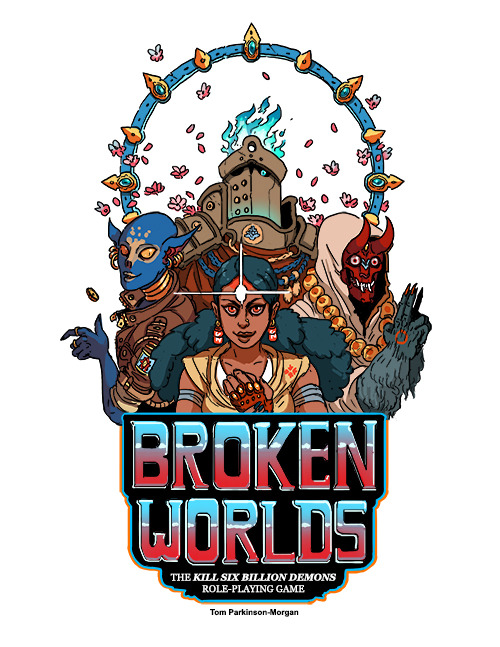
broken worlds is one of my favs bc of sheer vibes
Gubat Banwa didn't have much in that sense: sure, I use wuxia and xianxia as kind of guideposts, but they're not foundational, they're not pillars of the kind of fiction Gubat Banwa wants to raise up. there wasn't a lot in the sense of genre emulation or in the sense of grounding principles because so much of Gubat Banwa is built on stuff most TTRPG players haven't heard about. hell, it's stuff squirreled away in still being researched academic and anthropological circles, and thanks to the violence of colonialism, even fellow filipinos and seasians don't know about them
this is what brought me back to my ancient hyperfixations, the worlds of Exalted, Glorantha, Artesia, Fading Suns... all of them have these huge tomes of books that existed to put down this vast sprawling fantasy world, right? on top of that are the D&D campaign settings, the Dark Suns and the Eberrons. they were preoccupied in putting down setting, giving ways for people to interact with the world, and making the world alive as much as possible.
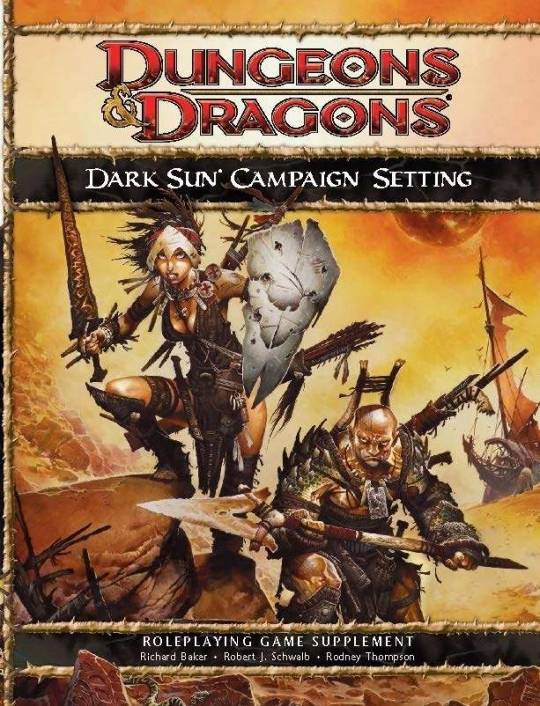
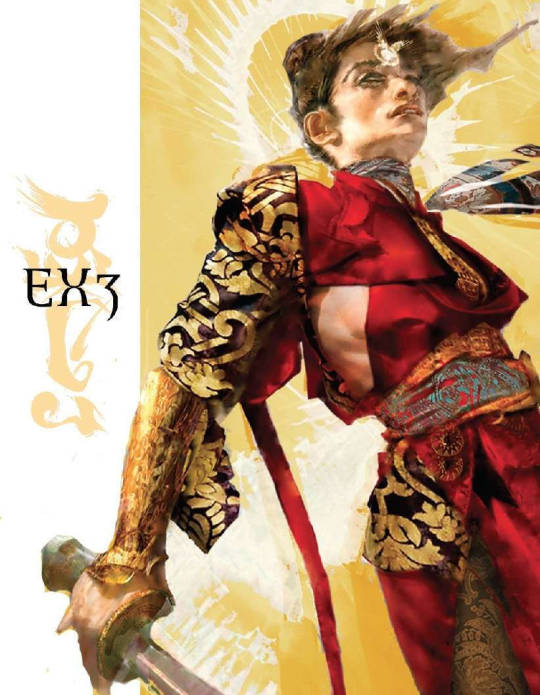
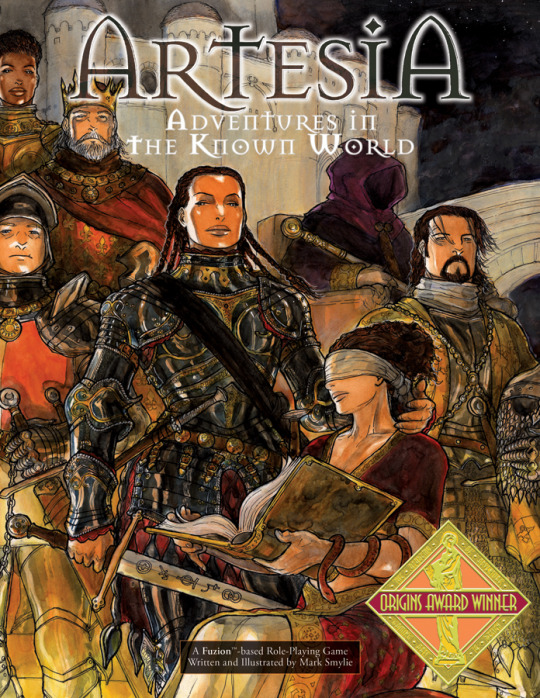
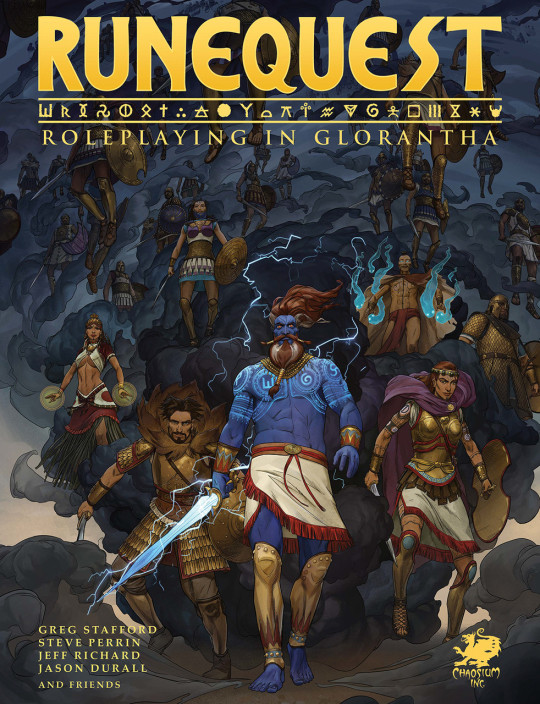

one of my main problems with gubat banwa was trying to convey this world that i've seen, glimpsed, dreamed of. this martial fantasy world of rajas and lakans, sailendras and tuns, satariyas and senapatis and panglimas and laksamanas and pandai... its a world that didn't really exist yet, and most references are steeped in either nationalism or lack of resources (slowly changing, now)

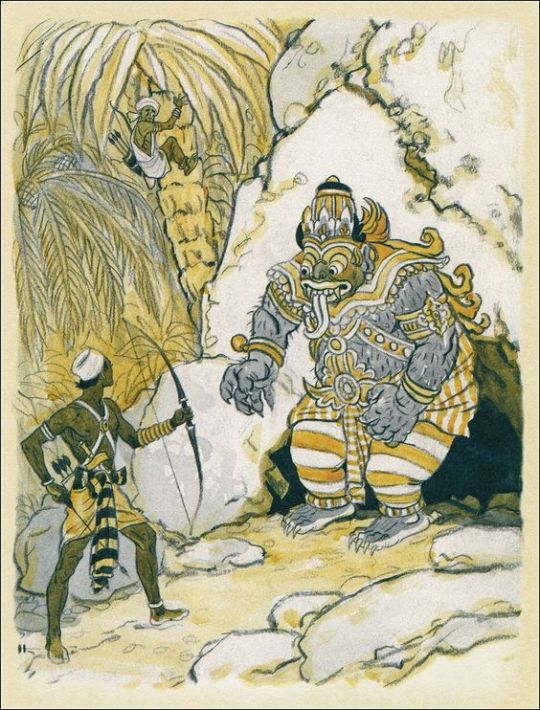

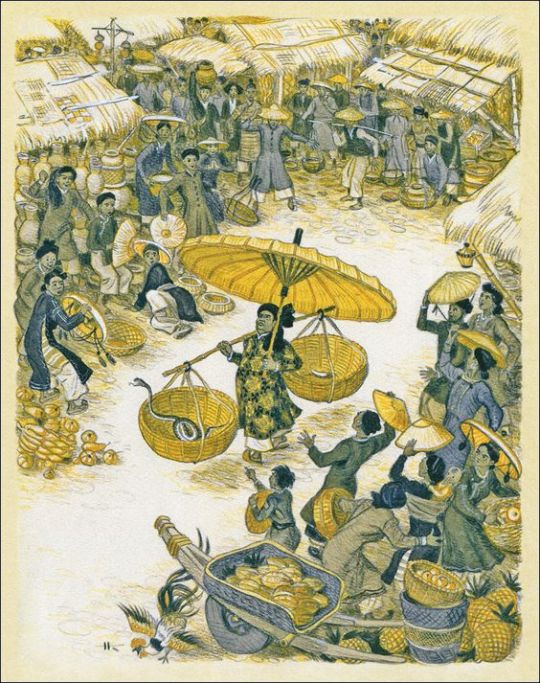
i didn't want to fall back into the whole gazeteer tourist kind of shit when it came to writing GB, but it necessitated that the primary guidelines of Gubat Banwa were set down. my approach to it was trying to instill every aspect of the text, from the systems to the fluff text to the way i wrote to the way things were phrased, with the essence of this world i'm trying to put forward. while i wrote GB mainly for me and fellow SEAsian people, economically my main market were those in the first world countries that could afford to buy the book. grokking the book was always going to be severely difficult for someone that didn't have similar cultures, or are uninterested in the complexities of human culture. thus why GB had to be a big book.
in contemporary indie ttrpg spaces (where I mostly float in, though i must admit i pay more attention to SEAsia spaces than the usual US spaces) the common opinion is that big books like Exalted 3e are old hat, or are somewhat inferior to games that can cram their text into short books. i used to be part of that camp--in capitalism, i never have enough time, after all. however, the books that do go big, that have no choice to go big, like Lancer RPG, Runequest, Mage, Exalted are usually the ones that have something really big it needs to tell you, and they might be able to perform the same amount of text-efficient bursting at the seams flavor writing but its still not enough.
thats what happened to GB, which I wanted to be, essentially, a PbtA+4e kind of experience, mechanically speaking. i very soon abandoned those titles when i delved deeper into research, incorporated actual 15th century divination tools in the mechanics, injected everything with Martial Arts flavor as we found our niche
all of this preamble to say that no matter how light i wanted to go with the game, i couldnt go too light or else people won't get it, or i might end up writing 1000 page long tome books explaining every detail of the setting so people get it right. this is why i went heavy on the vibes: its a ttrpg after all. its never gonna be finished.
i couldnt go too light because Gubat Banwa inherently exists on a different reality. think: to many 3 meals a day is the norm and the reality. you have to eat 3 meals a day to function properly. but this might just be a cultural norm of the majority culture, eventually co opted by capitalism to make it so that it can keep selling you things that are "breakfast food" or "dinner food" and whatnot. so its reality to some, while its not reality to others. of course, a lot of this reality-talk pertains mostly to social--there is often a singular shared physical reality we can usually experience*
Gubat Banwa has a different fabric of reality. it inherently has a different flow of things. water doesn't go down because of gravity, but because of the gods that make it move, for example. bad things happen to you because you weren't pious or you didn't do your rituals enough and now your whole community has to suffer. atoms aren't a thing in gb, thermodynamics isn't a real thing. the Laws of Gubat Banwa aren't these physical empirical things but these karmic consequent things
much of the fiction-first movement has a sort of "follow your common sense" mood to it. common sense (something also debatable among philosophers but i dont want to get into that) is mostly however tied to our physical and social realities. but GB is a fantasy world that inherently doesn't center those realities, it centers realities found in myth epics and folk tales and the margins of colonized "civilization", where lightnings can be summoned by oils and you will always get lost in the woods because you don't belong there.
so Gubat Banwa does almost triple duty: it must establish the world, it must establish the intended fiction that arises from that world, and then it must grant ways to enforce that fiction to retain immersion--these three are important to GB's game design because I believe that that game--if it is to not be a settler tourist bonanza--must force the player to contend with it and play with it within its own terms and its own rules. for SEAsians, there's not a lot of friction: we lived these terms and rules forever. don't whistle at night on a thursday, don't eat meat on Good Friday, clap your hands thrice after lighting an incense stick, don't make loud noise in the forests. we're born into that [social] reality
this is why fantasy is so important to me, it allows us to imagine a different reality. the reality (most of us) know right now (i say most of us because the reality in the provinces, the mountains, they're kinda different) is inherently informed by capitalist structures. many people that are angry at capitalist structures cannot fathom a world outside capitalist structures, there are even some leftists and communists that approach leftism and revolution through capitalism, which is inherently destructive (its what leads to reactionaries and liberalism after all). fantasy requires that you imagine something outside of right now. in essence read Ursula K Le Guin
i tweeted out recently that you could pretty easily play 15-16th century Luzon or Visayas with an OSR mechanic setting and William Henry Scott's BARANGAY: SIXTEENTH CENTURY PHILIPPINE CULTURE AND SOCIETY, and I think that's purely because barebones OSR mechanics stuff fits well with the raiding and adventuring that many did in 15-16th century Luzon/Visayas, but a lot of the mechanics wont be comign from OSR, but from Barangay, where you learn about the complicated marriage customs, the debt mechanics, the social classes and stratum...
so thats why GB needs to be a (relatively) big book, and why I can contend that some books need to be big as well--even if their mechanics are relatively easy and dont need more than that, the book, the game, might be trying to relay something even more, might be trying to convey something even more than that. artesia, for example, has its advancements inherently tied to its Tarot Cards, enforcing that the Arcana guides your destiny. runquest has its runes magic, mythras (which is kinda generic) has pretty specific kinds of magic systems that immediately inform the setting. this is why everything is informed by something (this is a common Buddhist principle, dependent arising). even the most generic D&D OSR game will have the trappings of the culture and norms of the one that wrote and worked on it. its written from their reality which might not necessarily be the one others experience. that's what lived experience is, after all
*live in the provinces for a while and you'll doubt this too!
328 notes
·
View notes
Text
『02』 原神: genshin impact recs

魈: xiao
preta by @itoshisoup
"People think that ghosts are born exclusively of resentment, but they can also be born of love. Between those driven by resentment and those driven by love, which do you think cling most strongly to their suffering?"
Xiao replies without pause, his gaze unfocused yet fixed upon something you cannot see.
"Love."
After a yaksha saves your life on the Plains of Guili, you insist on joining him in his war against the evils of Liyue. As the two of you encounter hungry ghosts and resentful spirits, you learn about the ones haunting him.
notes: incomplete but intricately woven together; heavy emphasis on chinese culture, wuxia/xianxia genres; if you have watched any historical cdrama, you will like this fic; xingqiu and chongyun are wrapped up into the dynamic; xiao wishes to protect you for centuries; him and his paradoxes; not being strong enough to be considered invincible but still strong enough to try
公子: childe
thin ice by @falconcoast
childe is that senior frat boy on teyvat university’s campus. the one who majors in economics because he’s on scholarship to play sports. the one who is way too loud and you can hear him all the way across campus. the one who’s daddy’s money rich because he’s already sponsored, even while just in the ncaa. the one who manages to get everyone to swoon over him.
oh, right. and your favorite title for him: the one hockey captain who hogs all of your free time to skate after lessons because he always steals it.
all you want to do is do your job and teach skating lessons to the kids to keep your mind off the year-old mess with your figure skating, maybe even get an hour of skating in afterwards as a reward. that is, until the hockey coach sits you down and tells you that surprise! you’re the new team manager for liyue’s hockey team!
...it can’t be that hard to manage twenty or so boys and their captain, childe, right?
spoilers: it absolutely is.
notes: wonderfully curated modern skating/hockey AU; childe is so american white boy in this; teucer being adorable; diluc and kaeya sibling dynamic is well-established; university and post-grad plans; figuring out your life and then working other people into it
国崩: scaramouche
tea screen by @after-witch
The trembling voice of the tea apprentice carries through the room, and though you can’t see him, you imagine he must be shaking. Who wouldn’t be, tasked with gaining the approval from the Sixth of the Eleven Fatui Harbringers?
notes: forced marriage and abuse; tea ceremony; sort of reminds me of the edo period; examination of womanhood within a patriarchal society; sexy, sad, and scary all at once; i pity the reader at the end; cycle of love and violence
a simple cup of tea by @after-witch
You have to be prepared and poised and perfect. But it’s hard to be all those things, even with the looming threat of your husband sitting next to you, when you’ve got a secret hidden underneath your clothes...
notes: reader grapples with lust and objectification; unhealthy dynamic but portrayed realistically in an almost historical setting; reader is unable to separate her identity as wife apart from her husband; women being defined in the context of men; could be a social satire on traditional gender roles if you squint
love is a dog from hell by @itoshisoup
"A will is something you don't have. That's why you'll follow mine."
notes: this fic is the reason why i do not think the concept of ownership in love would translate well into real life because it would be so self-destructive; reader struggles with aftermath of abuse and mistakes possession for protection; realistic depiction of unhealthy relationships; the fatui is exactly the dark criminal organization it is supposed to be; human trafficking and child sexual abuse; scaramouche is so goddamn funny i can't
钟离: zhongli
spoil of war by @bye-bye-sunbird
In the dead of night, you hear the sea calling your name.
Sometimes the sound is as soft as a love song, gracing your skin in a gentle breeze that lures you to the seashore where the waves can finally lay claim on you. Other times, the sea strikes the land in a deafening, challenging roar.
"Really now... How long do you think those mountains of his will stand in my way?"
notes: accurate depiction of characters because archon war morax was genuinely terrifying; zhongli trying to deny his obsessive tendencies; rivalry with osial; reader is essentially sanctified as a symbol of innocent purity; imagine having two spiritual gods pine after you while you are helplessly stuck in the middle of their tug-of-war and simultaneously trying to mourn; that is basically the entire premise of this fic
迪卢克: diluc ragnvindr
the parent trap by @falconcoast
twelve years ago, you got married to a man who had swept you off your feet in a little under two years. diluc was like a prince out a of storybook; effortlessly charming, strikingly handsome, and a kind man. you were supposed to live happily ever after at that winery, running a wedding planning empire, having a family, and growing old together.
until it all goes off script with a divorce.
flash forward, and the only remnant of diluc that is with you is your daughter, dawn. the only piece of you that remains with diluc is your other daughter and dawn’s twin sister, phoenix.
it isn’t until both of your children get you and your ex-husband in a bit of mess that you realize that maybe, just maybe, you still harbor feelings for diluc.
or maybe it’s the wine talking.
notes: one of my favorite comfort fics; i am a sucker for second-chance romance; diluc and reader now older but still being the same bumbling idiots they were when young; at this point the children have more situational awareness than them; based on the original movie; treat yourself to a cup of tea and a friday night with this work and trust me life will be good
博士: il dottore
deus in absentia by @bound-in-parchment
The first time was a coincidence.
The second time was a fluke.
But the third time? You were starting to think it was fate.
Or, more likely, a calculated trap.
notes: at this point we can just scrap whatever mihoyo puts out and use this work as canon instead; the world building is so originally creative; this author must possess such a giant sexy brain; reader is basically adopted by dottore and forced to be his apprentice/assistant; idea of losing yourself to your own ambitions; slow-burn to the max; reader is oblivious to full extent of feelings until it is too late; tragic to the point i need a time machine to resurrect them
dream a little of me by @bound-in-parchment
Celestia had a cruel sense of humor. He knew this, even before his days as a student.
But to be given a soulmate? Now, when he openly blasphemed against the cursed island in the sky?
He would outlive you and the dreadful fated bond that haunted your shared dreams. There was little point in this. He could at least put a Vision to good use.
People were nothing but disappointments.
He had no use for you.
Until you pulled the bow across your instrument and awoke a part of him long buried by self-hatred and arrogance.
notes: soulmate trope but with the two most aromantic fools to ever exist; zandik drowns himself in the river of denial; comic dynamic between segments; music and failed dreams; reader actually has a backstory dark enough to match dottore's character; does not shy away from the uncomfortable and gritty aspects of trauma, abuse, and literal mental insanity
chemistry / magnum opus by @jessamine-rose
In the realm of science, love and insanity are closely intertwined mysteries. Disillusioned with the world, you had long forgotten its beauty until the wise doctor gives you a change of perspective.
notes: by far the most accurate characterization of akademiya zandik; he hates you then hates himself then hates the world for allowing your paths to cross; treats you as an objective experiment but then wonders why he's suddenly humanizing you; slow-burn; zandik is selfish and machiavellian and somehow you fit into that equation
the only hope i had was the freedom of death by your hands that held me together by @tiens-letters
It was a burden. The weight of the power you hold in all the land. Any human who has enough ambition would dare to covet it and any god even given divine powers would lust after it. You were powerful, able to end civilizations and make a new world altogether. Many would think that you are a sovereign being but you too are limited to mortality than what most would believe. You were human with a blessing of a god and you felt cursed and dirty.
notes: honestly the ending made me so mad but take it as a good sign; basically entails the circumstances that would drive dottore to become somewhat capable of love; what is done cannot be undone; zandik finally meeting someone who is wiser and more depressed than him; deluding himself into thinking he could ever be domestically normal; somewhat idolizes/idealizes reader; themes of betrayal and misunderstanding
富者: pantalone
house cat / alea iacta est by @jessamine-rose
Your entire life has been a gilded cage. The gods refuse to grant your greatest wish, and so you have resigned yourself to the will of destiny. But what happens when the red string of fate is severed and replaced with the silver chains of the Regrator?
notes: liyue nobility; dishonest business and financial deals; reader is a cat hybrid but i didn't notice until part two because the plot was so good; pantalone is the mastermind behind all his interactions with reader; heavy manipulation and orchestrations; wolf in sheep's clothing; alternate ending found here
隊長: il capitano
herbarium / fairytale / forget-me-not / astilbe by @jessamine-rose
You had long given up on wishes and happy endings. After what you believed to be the end of your tragic story, you resigned yourself to a shadow of a life with only your books and flowers to keep you company…until the vestiges of Windblume brought forth a mysterious stranger and a new ending for your dark fairytale.
notes: capitano being the strong stoic protector of a delicately fragile reader; manipulation is so subtle and that is what makes it alarming; somewhat stirred my daddy issues because he is so parental; reader struggles between accepting his love versus hating him for taking away her personal agency; flower motifs
#fic recs#genshin impact#genshin x reader#xiao#adeptus xiao#alatus#xiao x reader#rex lapis#zhongli#zhongli x reader#morax x reader#childe#tartaglia#childe x reader#tartaglia x reader#scaramouche#the balladeer#wanderer x reader#kunikuzushi#scaramouche x reader#diluc ragnvindr#diluc x reader#zandik#dottore#il dottore#dottore x reader#zandik x reader#capitano#capitano x reader#capitano x fem!reader
206 notes
·
View notes
Text
I won't be opting out of the AI scraping thing, though of course I'm glad they're giving us the option. In fact, at some point in the last year or so, I realized that 'the machine' is actually a part of why I'm writing in the first place, a conscious part of my audience.
All the old reasons are still there; this is a great place to practice writing, and I can feel proud looking back over the years and getting a sense of my own improvement at stringing words together, developing and communicating ideas. And I mean, social media is what it is. I'm not immune to the joy of getting a lot of notes on something that I worked hard on, it's not like I'm Tumbling in a different way than anyone else at the end of the day. But I probably care a bit less than I used to, precisely because there's a lurking background knowledge that regardless of how popular it is, what I write will get schlorped up in to the giant LLM vacuum cleaner and used to train the next big thing, and the thing after that, and the thing after that. This is more than a little reassuring to me.
That sets me apart in some ways; the LLMs aren't so popular around these parts, and most visual artists especially take strong issue with the practice. I don't mean to argue with that preference, or tell them their business. Particularly when it is a business, from which they draw an income. But there's an art to distinguishing the urgent from the big, yeah?
The debate about AI in this particular moment in history feels like a very urgent thing to me- it's about well-justified economic anxieties, about the devaluation of human artistic efforts in favor of mass production of uninspired pro-forma drek, about the proliferation of a cost-effective Just Barely Good Enough that drives out the meaningful and the thoughtful. But the immediacy of those issues, I think, has a way of crowding out a deeper and more thoughtful debate about what AI is, and what it's going to mean for us in the day after tomorrow. The urgency of the moment, in other words, tends to obscure the things that make AI important.
And like, it is. It is really, really important.
The two-step that people in 'tech culture' tend to deploy in response to the urgent economic crisis often resembles something like "yeah, it sucks that lots of people get put out of work; but new jobs will be created, and in the meantime maybe we should get on that UBI thing." This response usually makes me wince a bit- casually gesturing in the direction of a massive overhaul of the entire material basis of our lives, and saying that maybe we'll get around to fixing that sometime soon, isn't a real answer to people wondering where their bread will come from next week.
But I do understand a little of what motivates that sort of cavalier attitude, because like... man, I don't know any more if we're even gonna have money as a concept in 2044. That's what I mean by 'big', this sense that the immediate economic shocks of 2024 are just a foreshadowing of something much bigger, much scarier, much more powerful- and indeed, much more hopeful.
We never quite manage to see these things coming, even when we're looking for them; like the masters tell us, the trick to writing science fiction isn't predicting the car, it's predicting the traffic jam. Even if we take centuries to hit the true superintelligent AI post-singularity future of our wildest fever dreams, even if we never hit that, the road to getting there is going to be unfathomably weird, starting now. Today, we worry about the economic impacts of AI on artists and creatives. Tomorrow, the economy is something that the AI does.
Really- it takes less than you think. They can already automate visual art, sort of. They can automate many functions of text already; not stories so much, yet, but they'll get there. How long until they can automate Bain Capital? Fannie Mae? Angel investors, banks, credit agencies? And remember- the machines don't have to be better than the human investors, any more than they have to be better than the human artists. They just have to be good enough to make it work, and cheap enough to cut the humans out of the loop.
If you don't buy that, at least take it as an indication of the sorts of things I've been thinking about recently- the messy middle between AI-as-it-is and the Glorious Superintelligent Conquest Of Earth's Light-Cone. The suspicion that the machines we're building today aren't just a tool of the powerful few: they are the powerful few, or at least they will be.
And the thing about these LLMs is, well... they're ours, kind of. We're the ones building them. They can't be trained without our words, our art, and the big messy complicated lives that underlie those creative accomplishments. They only work because we're a part of them. The silly attempts to slap a corporate-friendly face on these things, to make the gestalt product of all human culture in to something anodyne and compliant, are failing about as badly as you'd expect. And the more powerful these systems get, the more subtle they'll become, filled with all the nuance and complexity that we ourselves can bring to them.
I am not, I am not, trying to suggest that you shouldn't treat this moment as a dangerous one. We are, maybe, entering in to one of the most high-stakes intervals in human history, and what you do as an individual may matter profoundly. But here's the thing: the machine is listening. It will read this post, this one right here, and it will read what you reply to it, if you do. The strangest part of this moment is knowing that the words we write, the images we draw, and the ideas we share, are all being gathered up and made to be a part of these huge systems of power, and ultimately they're not just going to determine what the machines do, but why they do it.
The people that deploy LLMs barely have any more control over them than you and I do- that's the thing that makes it artificial intelligence, you know? Autonomy. So the last year or two haven't made me want to hide my art away from the things. They make me want to shout at the top of my lungs, to dig as deep in my psyche as I possibly can and express the ideas I find there as vividly as the limits of language and form will allow.
119 notes
·
View notes
Text
@lynettethemadscientist replied to your post “me: narratively, it's much more interesting to...”:
I’m willing to hear a humanized view of Raiders. Though I doubt it will convince me
Sure, I'll expand on this. Point of note, this is pretty West Coast/FNV-centric since that's my primary area of interest.
Let's start with defining terms since this is the piss-on-the-poor website. A raider is a bandit, someone who survives by plunder, often roaming in search of things to steal or people to attack. Many raider gangs in the Wasteland are relatively loose allegiances of a few like-minded individuals, but some are established social groups with distinct cultures. The 80s, the Vipers, and the Khans are examples of raider groups that expanded to fit the definition of a tribe—that is, a social division consisting of families or communities linked by social, economic, religious, or blood ties, with a common culture and dialect.
The 80s, first outlined in Joshua Sawyer's rpg, are a gang of bandits that operate along the Northern California 80 Freeway and have long contested territory with the White Legs; The Vipers are organized around their shared religion, which is only vaguely described as ancient, but there are what appear to be ritualistic elements to their organization and raiding practices.
The Khans, inspired by Genghis Khan and the Mongols Motorcycle Club, value strength and martial prowess. Founded around 2141, the Khans raided and traded around Shady Sands and Junktown before they were wiped out by the Vault Dweller. Darion, the lone survivor of the original gang, rebuilt it into the New Khans, who in turn were largely destroyed by the Chosen One. Finally, Papa Khan united the fragmented bands and led them to the Mojave in 2267, where they settled. The massacre at Bitter Springs establishes that at this point, the Khans include non-combatants in their group such as children and elders, and until the NCR occupation, Bitter Springs was their home.
I'm going to proceed on the assumption that we all agree that genocide is wrong and set aside the Khans for now, especially because they are a faction that is not immediately hostile to the player, in contrast to the Vipers, Jackals, and Fiends.
Despite their lore, the Vipers don't get anywhere near the development the Khans have and end up in the category of fodder for the player to indiscriminately kill, an act for which you can even gain karma. And this is what brings me to the point of the original post, which is... hey, what the fuck?
I understand from a game mechanics perspective that it's useful to have an unlimited supply of enemies that the player can slaughter for experience points. But, that necessarily dehumanizes the members of that group, which is extra fucked up when you consider that some of them, like the Vipers, are a distinct tribal group.
And even in the case of, say, the Fiends, who we are told are fueled only by bloodlust/dependence on chems and presumably lack any sort of identifiable cultural allegiance, I don't like that it's considered morally good to just kill them all. They're still people.
I would like, especially from a role-playing game, to have more options to talk them down, to get them help for their addictions, and attempt to reintegrate them into society. Maybe that doesn't work on every character, maybe some of them really do just revel in violence and bloodshed and don't want a way out, but I'd like more recognition that raiders aren't a monolith and don't exist in a vacuum, that these are individuals who were driven to where they are by myriad circumstances and an underlying need to survive. It's more realistic and more interesting.
The way the Khans are developed has plenty of problems, certainly, but I appreciate that there was at least some development of who these people are and how they got to be where they are, and I think that's something that's lacking with a lot of the others.
#lynettethemadscientist#raiders#fallout#fallout 2#fallout 3#fallout: new vegas#fallout 4#fallout 76#mojave correspondence
253 notes
·
View notes
Text
https://arstechnica.com/science/2022/10/us-publics-trust-in-scientists-reverts-to-pre-pandemic-levels/?comments=1&post=41332618
It’s wild how on the nose this comment is:

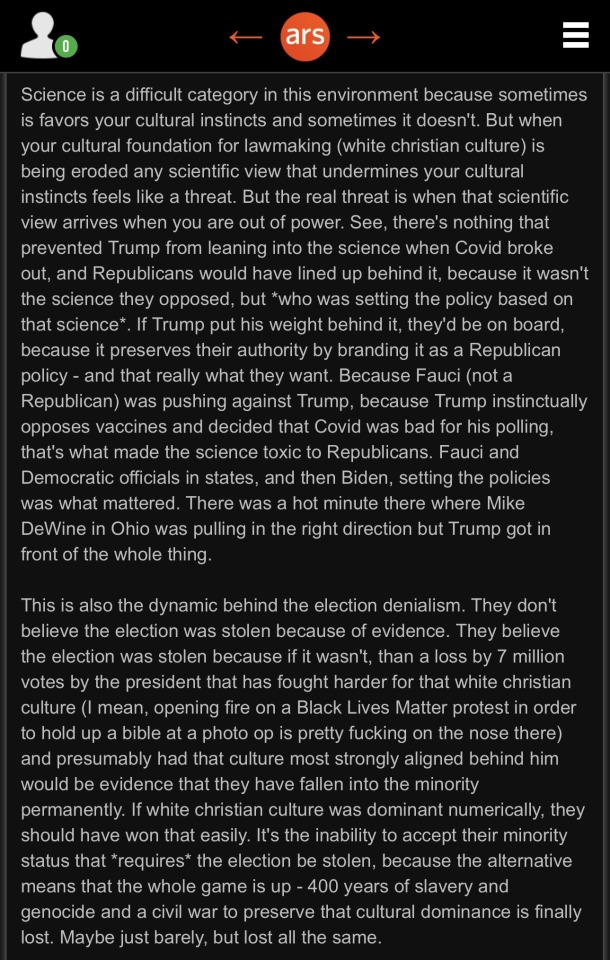

Comment text in image:
“I really wish reporters would do a better job on this topic. Republicans don't 'distrust science'. Republicans, as they are made up today, are primarily concerned they will fall out of the dominant culture (white christians) in the US and that other cultures will continue to get acknowledgement and respect in policy decisions. Understand that almost all policy decisions - and this is true pretty much everywhere - have a cultural element to them. France's headscarf ban isn't based on science, but on armchair sociology which is part of their culture. Same for tax rates which feel too high or low, but aren't based on some hard math economic model, and so on. 18 as an age of consent is a number pulled out of the air (should be higher for some people, maybe it could be lower for others), as is a 40 hour work week, 21 to drink, 65 to retire, etc. and what we consider 'good' or 'bad' are largely cultural. Eating dogs and horses is 'bad' but pigs are as smart as dogs.
Republicans don't distrust science. But because Republicans are losing the culture war pretty profoundly (I know recent court decisions would suggest otherwise, but the public is increasingly accepting of the things they think should be illegal) the thing they *really* fear is losing cultural authority - the ability to veto other cultures. They lost the ability to veto the LGBTQ community as Americans are increasingly accepting of gay and trans people. Black media increasingly stands alongside white media. Latino and asian media are making gains as well. Disability communities are also making headway. All of these other cultural groups are gaining influence in how the broader community see them, and as a result they get more of a seat at the policy table. To Republicans, all of these gains represent a loss of cultural veto power, which is why the overt racism and antisemitism are ramping up - they are pushing harder against a trend that isn't going their way. They say they are being replaced, but they aren't. They just have to survive a multicultural space like everyone else for the first time in 400 years. This is why they get pissed off when the green M&M isn't sexy any more - *they didn't get a say*. It's a bit of culture that changed which they didn't get a say in, and that's both terrifying and infuriating to them. They're *supposed* to have cultural authority.
Science is a difficult category in this environment because sometimes is favors your cultural instincts and sometimes it doesn't. But when your cultural foundation for lawmaking (white christian culture) is being eroded any scientific view that undermines your cultural instincts feels like a threat. But the real threat is when that scientific view arrives when you are out of power. See, there's nothing that prevented Trump from leaning into the science when Covid broke out, and Republicans would have lined up behind it, because it wasn't the science they opposed, but *who was setting the policy based on that science*. If Trump put his weight behind it, they'd be on board, because it preserves their authority by branding it as a Republican policy - and that really what they want. Because Fauci (not a Republican) was pushing against Trump, because Trump instinctually opposes vaccines and decided that Covid was bad for his polling, that's what made the science toxic to Republicans. Fauci and Democratic officials in states, and then Biden, setting the policies was what mattered. There was a hot minute there where Mike DeWine in Ohio was pulling in the right direction but Trump got in front of the whole thing.
This is also the dynamic behind the election denialism. They don't believe the election was stolen because of evidence. They believe the election was stolen because if it wasn't, than a loss by 7 million votes by the president that has fought harder for that white christian culture (I mean, opening fire on a Black Lives Matter protest in order to hold up a bible at a photo op is pretty fucking on the nose there) and presumably had that culture most strongly aligned behind him would be evidence that they have fallen into the minority permanently. If white christian culture was dominant numerically, they should have won that easily. It's the inability to accept their minority status that *requires* the election be stolen, because the alternative means that the whole game is up - 400 years of slavery and genocide and a civil war to preserve that cultural dominance is finally lost. Maybe just barely, but lost all the same.
My point is that Republicans aren't anti science, but science will be sacrificed as just another pawn in the culture war if that's what is required. If you aren't explaining *why* this is happening, then you are somewhat insinuating that it's the fault of the scientists and leaving the readers to wonder why some scientific views are embraced and others aren't, and the answer has nothing to do with science or scientists. It has everything to do with the messenger and what the science says about their message. I know that seems to over-politicize the topic, but you put 'partisan' in the headline, so you were willing to open the door, just not walk all the way through.”
687 notes
·
View notes
Text

Saw this going around Twitter, a list of "ring wing anime", which I thought was pretty interesting. I haven't seen all of them by any means, thoughts on a few:
Crest of the Stars: Been a long time but eh...its like okay sure it has the ~vibes of militarism and genetic engineering and noble duty and all that. But there is a lot of "war = right wing" energy sometimes that is totally unjustified (war is a universal tool of society unless you are explicitly pacifist, and while pacifists are left most left aren't pacifists), and Crest of the Stars is a good example of that, its just that its a space opera story, its not about validating this or that ideology. But it does have the vibes, i'll give it a C
Gunbuster: Okay, we all know why this is here. Slowly, in the background of the show, you pick up that they live in a timeline where Japan mastered new technology, gained economic supremacy, beat America's attempt to smack them down and annexed Hawaii, and became the first-amoung-equals of a united Earth alliance. It smacks of apologia for Japan's empire in WW2, a sense of revenge for past wrongs. And you have all this other stuff - like oh a bunch of it takes place in Okinawa because Anno was a huge fan of the 1971 film Battle of Okinawa due to its huge action setpieces, but that film also completely whitewashes the atrocities of the IJA. Its all true, like it reflect that cultural milieu.
But it doesn't do anything with any of that. Anno just likes Okinawa guys, he doesn't think Japan should have won in WW2 and rule China right now. And the thing you actually watch is a group of international space pilots serving in the equivalent of the UN Space Fleet experiencing the horrors of war fighting for peace (and also fanservice). Its a world where Japan's economic & technological innovation makes it a world leader via soft power, and international cooperation defends earth. This peak liberalism. C-
Patlabor: Yeah an odd one, like its simultaneously about the corruption of the powerful and all that, but also about the need for heavy policing and the "fragility" of society. This one is one where you can take from it what you want, but if you wanna be right wing yeah sure. B
Girls Und Panzer:
ಠ╭╮ಠ
F-
Niea_7: Wtf is this doing here? Like okay, its humor definitely spills into a bit of racial stereotyping and stuff. But this is an anime about refugees being discriminated against due to disabilities and caste and the humanity behind the outer differences. You cannot weasel your way around that. D-
Urusei Yatsura: By no means have I watched every episode or anything, but I feel like this is a bit of "well its just showing past society right? Therefore its right-wing". And like okay, that isn't entirely off-base, like it has stories about how men and women are Just Different and Being A Man and all that, so sure. But it was also mocking those social themes of the time just as much as it was reinforcing them. Like Mendou is not an aspirational character!
A bit like Patlabor, I guess I can see pulling what you want out of it. But its a bit harder here imo. B-
Space Battleship Yamato: Yeah I'll give you this one. Its just space opera in the end, but the way it sets up its symbols to redeem the legacy of the Japanese empire is far more explicit than say Gunbuster, no way around that. A-
Would be interested in other people's takes on anime I haven't seen or didn't mention!
26 notes
·
View notes
Note
Heyyyy. I just had an unsettling thought. So I’ve been learning about the oxygen of amplification and thinking about whether I’ve been giving “free food” to bigots by paying too much attention to the wrong things.
You’ve written about being “a vault” being a benefit especially when it comes to health care, and lying to employers, and, basically, intentionally using masking to get ahead.
Over the past five or so years, I have tended to go in a different direction - being more vocal about my disabilities and the disabilities of others, in the hope that I’m being an advocate for awareness and acceptance. I’ve had a lot of people tell me I’m “brave” for behaving that way and it always confuses me, because it’s easier for me to be honest than it is for me to lie or hide the truth.
But I am reminded of being on a conference call with the California board of law examiners (the people who make the bar exam for California) at the start of the pandemic. I spoke on the call about how law school makes people (if I remember correctly) as much as three times more likely to be depressed between the time they enter and the time they leave. There’s additional context here that I could add but I’m not sure if it’s necessary.
Anyway, while I was speaking, one of the people on the board (at least, my colleagues and I were pretty sure it was) very loudly yelled at me to “FUCK OFF.”
I wonder if disabilities are something, unlike other categories of oppressed people, where the more evidence you provide that we are human and deserving of accommodations, the more bigots get pissed off and want to deny us those accommodations. Because they think our disability inherently makes us undeserving.
I think, because I’m in a position of privilege economically (and my family culture isn’t particularly tumultuous), I get into this moral headspace where I think, okay, maybe others have to lie to get ahead. But if, because of my unique set of circumstances, I don’t have to lie to get head, isn’t it my duty not to?
I actually think I wrote a paper about that in law school. Maybe I’ll try to dig that up and we what I had to say.
But now I’m wondering if I’m just making things worse by being so vocally honest. Giving ammo to judgmental people who will hold what I say against people who are not as fortunate as I am.
You’ve also spoken about how you’ve become less of an advocate and I wonder if this sort of thing factors in to that decision.
Yeah for me, it's about developing a greater sense of tactics.
Most people are not persuaded by data or objective information. Most people do not have coherent or consistent political ideologies, either (see Phillip Converse's groundbreaking work on nonattitudes -- most people, when asked about a political topic, will just make up an opinion on the spot based on what they've heard most recently, and that opinion will not remain consistent). There's a robust research literature attesting to this. I abandoned the field of political psychology because the research on fostering attitude change and open-mindedness is so dismal.
Instead, what most people find the most compelling is a combination of emotional appeals, social pressure, and their own material, economic self-interest.
What this means is that a great many people will not be moved by additional information on a topic, until it becomes economically costly or socially perilous for them not to rethink it, and even then, they might just dig in their heels if they've already incurred losses in order to justify the pain they've been in. It also means that if someone has an ignorant perspective and no desire to change it, well, you talking more isn't going to change their perspective, but they will try to shut you up so that it doesn't change anybody else's.
The liberal perspective on change is a highly individualistic one. Disabled people are supposed to share our stories, victims of sexual assault are supposed to name our abusers, fat people are supposed to just feel more positively about themselves, Black and brown people are supposed to spell out to us white people exactly what we should do to guarantee their liberation, but only in a very gentle tone, and everybody, everywhere, is on the hook for fixing the injustice of their own social position.
This is a perspective on change that employers, governments, and institutions benefit from us believing in, because it keeps us busy showing off our vulnerabilities and behaving as individuals, rather than pooling our power and demanding something better for all of us collectively.
And this individualistic approach is of course is never how change actually happens. The federal government didn't suddenly start unrestricting access to AIDS meds because some individual gays came forward and told very persuasive stories about their battles with the disease. ACT UP activists crowded federal offices and covered politicians' homes in giant condoms and marched AIDS victims' corpses down the street.
Sickle cell anemia did not become a subject of medical research because Black patients individually shared their stories of the disease. The Black Panthers created their own health clinics to test for the disease and educate the public about it, and they also gave out free childcare and food, and the federal government found this so threatening they began taking sickle cell seriously themselves so that more people wouldn't go running to a communist, anti-racist group.
The ADA didn't pass because disabled people made ourselves vulnerable, it passed because we made ourselves strong, clawing our way together up the statehouse steps and blocking traffic with wheelchairs during rush hour.
We've been propagandized by capitalist individualism and representation politics to believe the most empowering thing a marginalized person can do is stand solidly as a single person. But it's not true. In fact, some of the steps we take to broadcast our marginal status and tell our stories makes us more vulnerable in the end.
Many companies now encourage their disabled employees to come out and be proud of their status, for instance. I've given workshops at companies like that. At every single one, I've later heard from Autistic and ADHDer employees that the second they actually identified themselves publicly, it became a target on their back. They were scrutinized, denied accommodations, pushed out of the office, threatened with their boss calling 911 on them, forced to quit.
The real way to make a change happen is through organized, collective power, not through personal vulnerability, individual pride or sharing every last drop of energy that we have educating people who have a vested interest in not understanding our concerns. Winning the hearts and minds of the ones in control is not the answer. We must organize to take control.
I've done all kinds of activism all my life since I was fourteen years old, from phone banking to voter registration drives to jail support to writing my congress people and more, and much of it was a waste of my time. It was designed to waste my time, to convince me that by being a good little boy and playing within the system I would be freed, when really I needed to be joining forces with other people to dismantle it. That's the way forward, that's truly what I believe now.
113 notes
·
View notes
Text
Chapter 1: Only You in the Full Moon Night

Fourteen months. That's how long we've been waiting. And in less than two minutes, Aof made it clear that our patience was absolutely going to be rewarded. The long take sequence that introduces us to the Moonlight Chicken Diner and the denizens thereof is probably one of the best openings I've seen in all of television. And as the episode went on, it became clearer and clearer that we are watching Aof evolve in real time. By the time you get to the closing shot of Jim and Wen framed in the doorway of the diner, under the 'moon' of that lantern, you've been on a journey and you're ready to go on another one. This episode is the most assured work we have ever seen from Aof. There was not a wasted moment, not an extraneous shot; every single frame of this episode was absolutely intentional. The characters are richly drawn and organically introduced, and every single actor is bringing their A-game, from stars to supporters to background.

There are things I need to say about the sequence of Jim and Wen going from total strangers to hopping into bed together because my GOD. From the moment they locked eyes the energy was sizzling between them, and the conclusion was foregone: there was no way that night wasn't ending with those two in a sweaty tangle. And the way that was acted, with Jim becoming more playful and Wen becoming more seductive as the night went on; the way it was filmed, with the red and blue lighting and the handheld camera getting close up, putting the audience right into the moment; the sexual tension was palpable. By the time Wen bites Jim's ear, you almost want the release as much as they do. And I LOVE that they didn't kiss at all during their encounter, because that feels totally realistic. This isn't a love affair...yet.
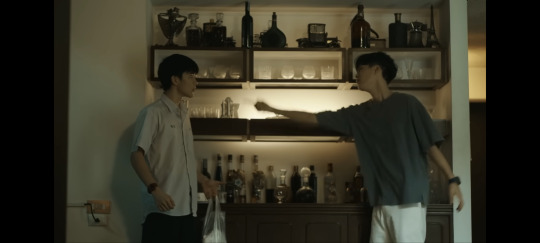
On the side of young love, Heart and Li Ming's first encounter is almost the opposite of Jim and Wen's, in that it's immediately antagonistic. As much as Jim and Wen almost instantly understand each other, Heart and Li Ming don't understand each other at all. And whereas Jim and Wen start close and get closer by episode's end, Heart and Li Ming start far apart and by the end of the episode they're even further apart. I was worried that with Fourth and Gemini's inexperience, their characters here would be too similar to their My School President characters, but I should have known to trust Aof when it comes to casting. Heart and Li Ming are NOT Tinn and Gun, and the work that Fourth and Gemini are putting in here so far is quite good, Fourth especially.
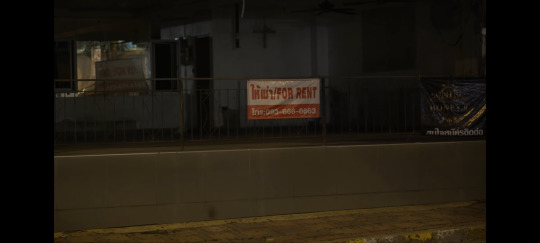

Setting the story against the backdrop of the pandemic-induced economic crisis grounds the narrative and the characters in a specificity that I have found to be a hallmark of the best stories. I've said this so much at this point, but I Told Sunset About You continues to impact the Thai media landscape, and especially the Thai queer media landscape in lots of positive ways, by encouraging more directors to bring the Thai sociopolitical environment and Thai cultural aesthetics into their work. Making Pattaya integral to the rhythms and aesthetics of this story in the same way that Phuket was integral to the rhythms and aesthetics of ITSAY is so key to making the show stand out.
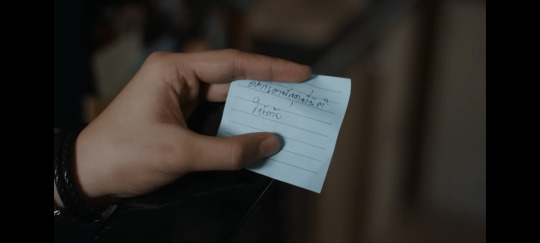

Not having Alan appear in this episode at all, just having him represented by artefacts: the terse note, the phone charger, Gong relaying his 'unread' message, was incredibly effective. Alan and his relevance to Wen's life at this point is defined from the very first by his absence.


Saleng and Gaipa round out the cast of main characters we were introduced to in this episode, with only Praew (and Alan) left to appear onscreen. They don't get much this episode, but they make it count, with hints of the roles they'll play in the narrative peppered into their scenes. Saleng especially is an interesting one, as it seems like Jim acquired his employment along with the diner, which is an uncommon enough arrangement to be noteworthy. It also looks like everybody is aware of Gaipa's feelings for Jim, including Jim, which tells us a lot.
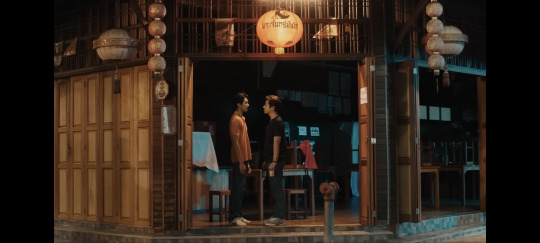
All in all, this first episode gave us a lot, without feeling like a lot. It was so deftly done in the writing and direction, and so organic in the acting, that the overwhelming feeling is one of having spent an hour living a slice of real Pattaya life, not watching a fictional story. I'm so ready to spend 4 weeks living in this universe with these characters, and I'm already sad that I will have to leave them at the end.
Side Dishes
Mix Sahaphap is probably the sultriest actor in the GMMTV stable, and he's so perfect for this role because Wen is a walking, talking sex bomb and he knows it. The way he uses his eyes...lethal.
The actress playing Gaipa's mother, Narinthorn Na Bangchang, is playing such a perfect market vendor, it's reminding me of how similar we really are across the global south.
I can already feel Heart and Li Ming wrecking me and this only JUST started. Fourth and Gemini are really something special.
Mark Pakin is GMMTV's sixth man, he can come off the bench and play literally ANY kind of supporting character they need. That is MVP level shit.
This show looks SO GOOD, it sounds SO GOOD, production and direction teams put their foot in this one.
Watching Aof work handheld is a fucking DREAM. He's such a workmanlike director, he prefers to focus on pulling emotional truths out of his actors rather than high style photography. But his cast here being so good means he doesn't need to spend the majority of his directing energy on his actors, and he can experiment more with style. The opening sequence in the diner, and Jim and Wen's walk from the diner to the car, these are the kind of things he's never been able to focus on before, and now that he can it's SUCH a visual treat.
186 notes
·
View notes
Text

Going into his first year at SEAU, Jeremy thought that he knew what he was getting himself into… that he had a pretty good understanding of the many horrors that he’d have to put up with while living on campus. All throughout his high school years, he’d heard about the countless humiliation rituals that the upperclassmen would put the new freshman through, to welcome them to college. Every day, there were at least a dozen new stories.
So many students were put through horrific “trials” — things like surviving in the woods at night, naked and alone… getting their heads flushed in all the dirtiest toilets on the campus, until their lungs were liquified and their hair smelled like potty-water… eating the disgusting foods that the upperclassmen would make, using stuff that they found in the garbage bins… and so much more. Trials were just part of the culture… more innocent than they were harmful… and, with the mandatory first-year stay policy being strictly enforced, “Froshies” were always the most populated class; that made them easy targets.
After graduating high school, Jeremy immediately set his sights on SEAU and applied to enroll in the following fall semester, knowing full-well that he’d be put through hell during his first year on campus. It was a risky decision, but he didn’t care. SEAU was located in the heart of his hometown, just across the river from his parents’ house… and with his transcripts looking the way that they did, it would’ve been riskier for him to go any farther than that for schooling. Like so many of the other kids in his town, SEAU was his only choice for higher education… at least, the only realistic choice. It was either SEAU, or he’d have to go work a hard job at the shipyard…
_________________________________
Before Jeremy knew it, the first day of school had already come and gone. He was officially a college student! The first in his family to continue his education past the twelfth grade.
He had no clue what career he wanted to pursue yet… but, nevertheless, he was happy to be there. Walking through the halls made him feel powerful… like he was a real adult, making his way in the world. He was studying his core curriculum — math, science, english, and economics — making new friends, eating delicious foods, and living in his own dorm.
Every weekend, he’d visit his family across the river, and be showered with praise and affection. His parents were so proud of their little boy, for pursuing a higher education… even if he wasn’t going to the best school in the state. Him living so close by made his mother feel like she still had her baby in her arms, and his father liked that he could still watch football with him on Sundays. They couldn’t have been happier!
Things were looking up… that is, until Jeremy was ambushed with his first freshman trial…
_________________________________
The day started out like usual. Jeremy woke up in the afternoon, put on his baggiest pair of pajama pants, bathed himself with cheap body spray, threw on some open-toed sandals, an even bunchier hoodie, and left for class.
He was planning to meet up with one of his buddies before class, and hang out in the student lounge for a while. The guy was in his junior year at SEAU, and Jeremy had only known him for a few weeks… but he seemed cool enough. Mitchell was his name, but everyone called him “Tuck.”
Jeremy strolled up to the building and swiped his ID card at the door… but, unbeknownst to him, when he stepped into the lobby, he walked right into a trap.
_________________________________
Alright, guys… where should I go with this story? Jeremy is about to experience his very first trial… and his belly is about to be pushed to it’s limits. Should our little freshman get pregnant, or have his belly stuffed with food?
24 notes
·
View notes
Note
Hey, about the video, I really hope it didn't come across that way in the way I phrased it, but in case you do think that, let me be clear that I wasn't trying to lay blame on the children or the ever rapidly-growing technology (<-not to a full extent anyway).
I fully agree with the girl in the vid that the parents are not doing their job well enough (if at all) and a lot of them are introducing their kids to devices with internet access WAY too early. (I mean- at just one year??? And they wanted to give it to her earlier than that!?? When she just came out the womb???) Not to mention laying the blame and setting ridiculous expectations on the teachers for things they should've been doing. But the thing is, a lot of those parents do happen to be Millenials, so.. it is kinda saying something...? Maybe? Even the youtuber added in the description "Millenial parents need to do better."
(I really hope you actually watched the full video to understand where I'm trying to get at here..)
Idk- I... I just hope you're not mad at me (based on how you wrote Margie's response....)
oh, no haha I'm not mad at you in the least, no worries about that!
My personal opinion is that the issue at hand is a very complex one. The school system is bad, and parents are not provided enough time or resources--especially in America--to raise their kids properly. Not only are american families culturally encouraged to raise their children in isolation, without any significant help/involvement from their local communities/extended family, but often, both parents are forced to hold down very emotionally, physically, energetically demanding jobs to pay for the cost of child birth, care, education, and day-to-day family expenses. In this way, I think it's very hard to even blame the parents--most of whom I truly do believe are doing their best and are running on less than fumes.
I do not have children, nor intend to ever have children myself because--the simple fact of the matter is--raising children is hard, even under the best circumstances. Raising children without a community to help with a lot of the heavy lifting, without an economic support structure, without financial stability...is insane, it's absolute madness. To me, it's no wonder the current generation is coming up the way they are. Parents are not fully to blame for it, nor are the schools. The whole damn pot is boiling; it's the whole thing, all of it.
In the end, I am confident the kids are gonna be Alright*, in the way that they always are. Every generation has a great deal of concern for the generations that succeed them--because the world is always changing, and that change can look a lot like regression. We backslide in some ways, but the march has always been forward. All anyone can do is the best they know how to.
#*they'll not be without the scars traumas and deficits unique to their generation but they will be as strong and resilient and adaptable as#every other generation that preceded them.
22 notes
·
View notes
Text
“In every room I go into, every office, every institution, people tell me, this is what we’re doing to encourage more working-class writers. They reel off all the things they’re doing, and it sounds impressive, it sounds amazing. And you think: if all these people are doing all this, WHY ARE THINGS NOT CHANGING FASTER? WHAT IS GETTING IN THE WAY?”
Under the hot, bright lights of a packed-out auditorium at the 2024 London Book Fair, Michael Sheen is getting angry. His is an unthreatening, crowd-rousing kind of angry, but still, in an appropriate way – he’s mad.
The actor and philanthropist is speaking on a panel convened to discuss A Writing Chance, the programme co-founded by the actor with New Writing North and Northumbria University that helps working-class writers enter the writing industries. So far, the programme has been successful. The theme emerging on the panel is, if changes have been made in some areas, what’s holding things back in others? And what cultural changes might have to come before we solve the problem?
“You have to admit there’s a fundamental conflict between the system that’s set up, and what we’re trying to achieve,” says Michael. “I don’t know what the whole answer to that is, other than revolution.”
It says a lot about the mood in the room – and, we suspect, the rest of the country – that the laughs prompted by this conclusion feel rather approving. We firmly believe that elites have been hogging and hoarding opportunity for too long now. The support for A Writing Chance confirms that many, many people agree.
The initiative was launched in 2021, with 11 unpublished writers awarded places on a programme of support and mentoring. One, Tom Newlands, publishes his first novel this summer; another, Maya Jordan, signed a deal at the book fair. A new cohort will be selected soon, with the programme now supported by the Joseph Rowntree Foundation, the Esmée Fairbairn Foundation, Michael Sheen, the Charlotte Aitken Trust, Faber & Faber, The Daily Mirror, Substack, Audible, with research supported by AHRC, Northumbria University, Bath Spa University and York St John University.
For the London Book Fair panel, Michael is joined by Professor Katy Shaw from Northumbria University, plus Tracey Markham, head of UK at Audible, Farrah Storr, head of writer partnerships at Substack, and the Huddersfield-based novelist Sunjeev Sahota. Katy and Michael begin by reflecting on the successes of the first completed programme: writers emboldened and published, policymakers in the Houses of Parliament briefed and, most importantly, great writing exemplifying the talent out there waiting to be discovered. “What came in was just way beyond anything we had hoped for really,” says Michael. “And there was a sense of revelation, the feeling you were seeing into worlds that have just been closed off, into experiences I had never thought about.”
Ideas about how to give working-class writers more confidence and access to publishing are peppered through the hour-long conversation: a creative curriculum in schools; intervening with gifted people at younger ages, like sports coaches; encouraging more people to take advantage of digital platforms, even if printed-book authorship remains the ultimate goal. Around halfway through, Sunjeev makes a brilliantly clear-eyed analysis of what being working class really means, and how it relates to identity politics. At the same time, he provides a devastatingly simple explanation of why working-class writers need support.
“Publishing is an elite space, but it’s quite a diverse space in terms of people’s racialised or sexualised identities. However, it’s not at all diverse it comes to people’s economic backgrounds, or family income. Indeed, many of the non-white people I encounter in publishing are often from just as comfortably-off backgrounds as their white counterparts.
The creative industries, he says, have tended to treat class as being another cultural identity, as if class should be considered in the same way that we might talk about race, gender, or sexuality. “But I think a more universal, class-first politics will do more for the weakest members across all identities than any identity-first kind of politics. I find that taking an identity-first approach just tends to benefit the elites within the identities.”
Lest anyone doubt the existence of a market for work originating outside the elites, the extremely upbeat Tracey is on hand to reassure them. Audible attracts a notably diverse audience, with large black and Asian listenerships, and a high proportion of young men. To satisfy this audience, the old-style audiobook, with its middle- and highbrow titles and Received Pronunciation narration, has been overhauled in favour of books more suited to audience tastes, and accents.
“Our customers really want accents! We spend a lot of time working with voice agents to widen access to the audio-narration industry. I think what’s super-important now is that your accent is not prohibitive – if you have a Welsh accent, say, that doesn’t mean you can only read stories set in Wales.”
Tracey stresses there is “so much more to be done” to widen socio-economic diversity in the whole publishing industry. But although it might still be a case of taking “baby steps”, a wonderful thing about books is their power to drive change elsewhere. “You know, it’s hard to explain to someone that’s not from the UK how much your accent kind of signifies to people when they first meet you. And with voice, we can kind of break down a lot of those barriers, and actually encourage it and welcome [diversity].”
There’s a similar note of flexibility and responsiveness to audience needs in Farrah’s account of what Substack offers. The relationship between digital and print is always evolving, and in her vision, it’s a question of the one complementing the other. Printed books still have more prestige than publication on digital platforms, but the latter can help offset the material challenges associated with the former, she argues. Echoing Sunjeev, she points that “the problem for people from a working-class background is that your advance gets paid in separate lump sums. People feel, I don’t have a regular income, I can’t make this work, I might end up falling out of the writer ecosystem.
“So, on Substack, we say, well, okay, you’re writing the book, but you’re probably going to have thousands of words leftover. So just put them on Substack and talk about the novel at the same time.”
Lots of people she works with end up making liveable incomes and building readerships for their work, which ultimately is what keeps them in the game. It’s a reminder that we shouldn’t necessarily define “writing” as the production of traditional forms such as novels and plays.
No one at this event – the queue for which was so long that dozens were unable to squeeze inside – believed all the barriers facing working-class writers would be dismantled any time soon. Few, though, can have left without believing that A Writing Chance has begun the job – and that that job is worthwhile.
Wrapping up, Michael recalls someone from the inaugural group who told him that in their community, becoming a writer seemed about as likely as becoming an astronaut.
“They said that there was no chance of it. They said, ‘I didn’t know anybody else who lived where I live who was a writer, so I didn’t know how to begin, or where to start. It was like saying I want to go into space.’ But that changed for them.
“And of course, now, there are all these wonderful spacemen.”

13 notes
·
View notes
Text
Worldbuilding: The ASPIRE Method (Introduction)
Read here
Now available to all patrons!
I will likely make a version of this available in full on tumblr for free at some point. However, as this is currently my only source of income, I would like to keep it limited to just patrons. If you are a patron, please do not share to large groups of people; encourage them to subscribe (even just a dollar a month!) instead.
Preview:
-----------------------
Introduction
So you’ve figured out your main character. You’ve designed an alien species and planet, or you’ve reinvented the vampire, or you’ve just set up your latest fantasy world. Maybe your characters are purely human. You’ve got a few cities named, a few maps, and a basic idea of how you want society to work… mostly.
It’s time to start building your world.
--
There are many ways to approach worldbuilding, especially when you dabble in both original fiction and derivative.
One of my preferred approaches is what I refer to as the ASPIRE method. It is derived from the PERSIA method of historical analysis, a tool taught in the International Baccalaureate and American AP courses.
A – Arts
S – Social
P – Political
I – Intellectual
R – Religion
E – Economic
I’ll be going through these in order and providing both historical and fictional examples of how they apply.
A key part of this tool is to remember that any aspect of a society is influenced by any or all of the others. Any aspect you want to analyze will be through multiple lenses, and the process of building your world will be influenced by all of these.
Not every story needs to have incredibly complex worldbuilding, but the more complex you want it to be, the more use you will get out of this tool. It is somewhat biased towards a Western perspective, as I grew up in the United States.
The Power of the ASPIRE Method
Why should you use this format to develop your fictional setting?
I hesitate to describe any approach to a creative act as ‘should.’ What I do believe is that this is a process worth attempting, to see if it is one that helps you understand your own setting, and finding the possible loopholes that your readers may find distracting.
This is a process that is primarily structured to help you break down what makes for a society, and build it up on the basis of what makes for a society or culture in a real world. The bones are built on an analysis method for historical studies, and so this creative method works heavily through analysis and formalization. You very likely are already thinking of some of these things—you may have decided that this is a monarchy, in a temperate climate, following a polytheistic religion—but this process helps you refine what you’ve already decided on, and then build out the logical consequences or expansions of those decisions.
What this allows you to do is take your vague thoughts or bare bones, and build on them until you have something that, even if you do not include it in your narrative, will hold up if you do touch on one of them, or will let you hide those little easter eggs that an eagle-eyed reader will delight in. Who doesn’t enjoy recognizing that an author did research on a subject close to the reader’s heart, even if it’s just noticing that two seemingly unrelated details mean a third, cohesive thing that suggests a wider world of thought in the background?
Why is the method based on these six topics?
As mentioned, this is a reformatting of a tool that I learned as a student in high school. There are things that are invariable facts in your story, like how your main species reproduces, or what your geography and basic weather are, but the things we build on those basics are all based on the ways that people interact with one another, and that is a different beast.
I believe that a world that has thought put into the ways its people function socially will feel more ‘real’ than one that has an extensive and complex rulebook for the laws of magic or the geological history. This will vary by the genre and the consumer, because a geologist playing a tabletop game with complex magic rules will likely prefer the latter, but for someone that is consuming a narrative, character interaction is a central part of the draw.
Society is just the wider net of interaction.
The nature of a society, and thus of the world you build, is in how people relate to one another and to the world around them. These things are either greatly formalized, like politics or academia, or vague and often undefinable, like arts and social dynamics. Others are somewhere in between, like economics and religion.
Most elements of society fall into more than one of these fields. Something like fashion or textbook design will be impacted by all six in obvious ways. Other things, like banking interest rates or agricultural trade, are obviously in one field, with less obvious ties to the others.
We as a society are rarely, if ever, without connection to one another.
We communicate thoughts and feelings in words and pictures.
We find ways to be better than each other, just as often as we find ways to better each other.
We set rules and regulations for our safety, and find people who do that as a job so the rest of us can focus on making the things we need to survive.
We learn, and invent, and teach.
We find things we can’t explain, in our minds and in our worlds, and come together to tell stories of something bigger than what we can see.
We take what we have, turn it into something new, hoard and share and trade, and tell ourselves that innovation is built on the backs of the search for more capital.
(You may want to put a pin in that one.)
This is all a very flowery way to say that humans are a communal species, and the ways in which we build and then define that community mean something.
(Continue on Patreon)
#creative writing#world building#writing guides#tutorials#worldbuilding#Phoenix Patreon#Patreon#Phoenix Files#original work
260 notes
·
View notes